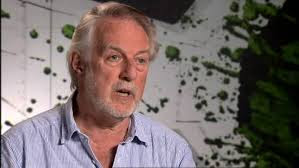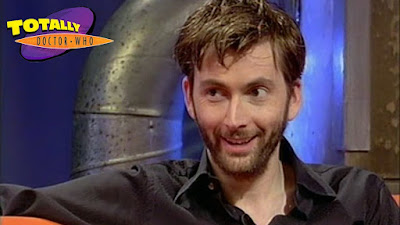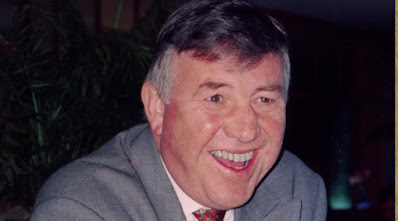Synopsis:
As he opens the display case in which the key is held, someone strikes Ian down from behind. As he lies on the floor beside the body of a dead man, his attacker places a club-like weapon in his hand...
He awakes to find himself being studied by a man in black uniform who introduces himself as Tarron, an Investigator. Ian is informed that he is suspected of killing the man he had found lying on the floor of the vault. Challenging Tarron to prove it, he is horrified to learn that the justice system in Millennius is that people are guilty until proven innocent, rather than the other way round. Ian is already guilty and sentenced to death, unless he can demonstrate his innocence.
Barbara, Susan, Sabetha and Altos are permitted to visit him. When he asks who in the city might be able to defend him, the Doctor appears and claims the role. He reveals that the dead museum guard was Eprin - the friend of Altos, who the Doctor had gone ahead to meet.
Altos and Sabetha are despatched to the library to study case files of similar crimes.
Susan and Barbara go to the vault where the Doctor recreates the crime. They work out that the only person who could have done the killing was the guard who was first on the scene - having gone out into the corridor and then only pretended to be arriving. This is a man named Aydan. However, knowing this does not necessarily mean Ian can be freed. Proof is needed.
When they go to visit Aydan they meet his wife, Kala. The young man becomes angry at being questioned, and they witness him assaulting Kala when he thinks she has spoken to them about him. After they have gone, Kala is contacted by phone by a man who tells her that her husband is becoming a liability...
As the trial begins, the Doctor must face Prosecutor Eyesen. He has decided to force Aydan to reveal his guilt by setting a trap for him. Called as a witness for the defence, Sabetha claims that one of her keys is actually the one stolen from the museum - and that it was given to her by Aydan. When it looks like he is going to break down and tell of what really happened in the vault he is shot dead by an unseen assassin in the crowd which surrounds him.
The Doctor admits his subterfuge to the court. The senior judge states that these events do not necessarily acquit Ian. Unless there is new evidence, his execution will proceed.
Concerned about the investigation, the criminals decide to take action.
Barbara receives a note claiming that there will be another death, and then takes a call from Susan, telling her that she has been kidnapped and will be killed if the investigation continues...
Next episode: The Keys of Marinus
Data:Written by: Terry Nation
Recorded: Friday 17th April 1964 - Lime Grove Studio D
First broadcast: 5:15pm, Saturday 9th May 1964
Ratings: 7.9 million / AI 61
Designer: Raymond P Cusick
Director: John Gorrie
Additional Cast: Henley Thomas (Tarron), Donald Pickering (Eyesen), Fiona Walker (Kala), Martin Cort (Aydan), Raf De La Torre (Senior Judge), Alan James & Peter Stenson (Judges), Michael Allaby (Larn).
Critique:This episode owes its inspiration to the courtroom drama and the locked room murder mystery - genres which the viewing public would have been very familiar with.
The twist is that in this society you are guilty until proven innocent, rather than the conventional opposite.
We learned in the first episode that the Conscience Machine had made Marinus a peaceful world, as it suppressed evil intent in the population other than for the Voord. The Doctor does mention that murder is a very rare crime in the city, but not that it is non-existent. The citizens also have a judicial system set up to deal with the crime, including the penalty, at a moment's notice. What kind of job security would Eyesen and the guards have if crime never took place? All the evidence points to crimes other than murder being fairly common in the city, as it seems to be across the whole planet, where we've seen Darrius afraid of thieves and Vasor capable of murder and rape. We have no idea about the motivation of the Ice Soldiers, as their nature is never explained, but the Morpho creatures are able to enslave and kill, so it's not just the Voord who are immune to the machine's pacifying effects. Again, we are never told the true nature of the Morpho - are they alien interlopers, or a homegrown menace?
The question we therefore have to ask ourselves is: how long is it that the Conscience has been inoperative? The timescale mentioned by Arbitan is quite confusing, suggesting at times that the machine has only just stopped working, and at others indicating that many years - even centuries - have passed.
Last week I questioned the whereabouts of the other travellers, and I'll repeat it here, for we are never given any explanation. The whole set-up of the story is that Ian hasn't got any witness to prove his innocence, despite travelling with four other people from Vasor's cabin in the mountains at the exact same time. Only he has appeared inside the museum vault. As he is knocked unconscious, and the scene doesn't pick up until we see him wake up, we have no idea where his companions were or what they were doing in the immediate aftermath of the assault.
Another issue is that Tarron seems quite content to leave the unconscious Ian lying on the floor with a head injury, rather than, say, take him to hospital. He's also quite happy to sit alone with someone who he believes to be a murderer. Ian hasn't been tied up and there aren't additional guards present.
For one TV critic at least - Bob Leeson of the Daily Worker - this episode's trial setting was a sign that the story was flagging. Viewers may well have agreed with him, as one million viewers failed to tune in for the next instalment. A lack of monsters this week, and a general lack of incident, may also have been a factor.
In The Daleks Terry Nation had given the Thals Germanic names initially - e.g. Kurt - which were amended at David Whitaker's suggestion to be something more other-worldly. In this episode, however, we get the first example of a character being called Tarron or similar. Nation will deliver variations of this for many of his stories, including episodes of Blake's 7. We will get Taron, Tarron, Tarrant and others. (He is also quite fond of single syllable first names, ideally of only three letters - Del, Roj, Kert, Kerr, Marc, Bret, Bors, Lan, Gan, Zen etc. B7's Del Tarrant has the ultimate Terry Nation name).
I believe that the "Taron" names might well derive from his own name - Terry-N.
Ray Cusick was happier with the sets for this episode. Nation had described the courtroom as a U-shape, with the judges at the open end and Ian on a dais in the curve. The colour scheme was white, with highlights, such as the swastika-like symbol, picked out in red.
Kala's rooms were deliberately kept sparse and minimalist, and used set elements from earlier episodes, such as room dividers from The Velvet Web.
William Hartnell is back and feeling refreshed after his fortnight's break. He told reporters that he had spent some of the holiday at Lingfield racecourse, where he bet on two winners and two runners-up.
He appears to have one good fluff, however: "I can't improve... I can't prove at this very moment...".
Surprisingly, this fluff was actually scripted.
Carole Ann Ford was absent from the first day of rehearsals as she was at Ealing Studios filming material for the second and third instalments of The Aztecs, which would allow her to be the next regular to have a holiday.
Trivia:
- From this week the series reverts to its original start time of 5:15pm, positioning it between the Telegoons and Juke Box Jury.
- The change in time did the series no favours at all - it lost 2.5 million viewers on The Snows of Terror. There were two reasons for reduced audiences when programmes changed their start time in the pre-video recorder age. One was that the change simply took people unawares and they tuned in too late, and the other is the impact of whatever was on the ITV channel opposite Doctor Who. If a popular programme on ITV has already started, you might be reluctant to turn over when the BBC show starts 5 or 10 minutes later.
- Alan James, who had played an Ice Soldier, now plays one of the non-speaking judges - they simply nod or shake their heads whilst Raf De La Torre gets all the lines.
- Michael Allaby, another Ice Soldier, plays the character Larn, who is Tarron's guard colleague.
- Third appearances by Martin Cort and Peter Stenson. Cort gets a proper speaking role this week, whilst Stenson is the other judge.
- Donald Pickering and Fiona Walker will both feature again in the series right at the very end of its first incarnation, in the Sylvester McCoy era - he in Time and the Rani and she in Silver Nemesis. Pickering will also appear in a story opposite Patrick Troughton - The Faceless Ones.
- Gorrie cast Walker after she wrote to him: "I am an actress. I am a good actress. I am too good an actress not to be working, so I hope you can do something about this". He found this letter so amusing that he offered her the role of Kala.





















































